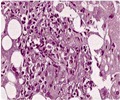Traumatic memories can be influenced and weakened by drugs like doxycycline, reveals study.

Currently, animal models may not be suitable or effective for this purpose. However, the research team from the University of Psychiatric Hospital and the University of Zurich may successfully test a new drug which can considerably weaken the recollection of negative experience in humans.
Doxycycline inhibits enzyme involved in memory formation
The team headed by Dominik Bach, an UZH professor and a physician at the University Psychiatric Hospital, presents a new approach. They studied how inhibiting an enzyme that is important for strengthening connections between nerve cells affects traumatic memories.
Lab experiments only recently revealed that proteins from the extracellular matrix, the space between nerve cells, are necessary for memory formation. Known as metalloproteinases, these enzymes are found throughout the body and involved in the development of heart disease and various cancer strains.
The antibiotic doxycycline inhibits the activity of these enzymes and has already been tested for several of these diseases. Now the UZH professor and his two study authors examined how doxycycline affects memory formation.
Negative reactions two thirds weaker
Almost 80 people divided into an experimental and a control group took part in the study. Test subjects were given mildly painful electrical impulses, which they learned to associate with a specific color. The experimental group received 200 mg of doxycycline beforehand, the control group a placebo. The test subjects in the control group showed increased startle responses upon seeing the color when tested seven days later.
Advertisement
Usable in combination with psychotherapy
The results show that metalloproteinases are not just useful tools in the lab; they are also relevant for memory formation in humans. According to Bach, these enzymes provide key starting points for the development of therapeutically effective substances.
Advertisement
"We're planning to test this combined therapy model first in healthy people and then in the clinic," concludes Bach.
Source-Eurekalert










